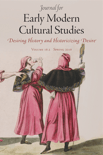
Journal for Early Modern Cultural Studies
Scope & Guideline
Advancing Knowledge Through Early Modern Perspectives
Introduction
Aims and Scopes
- Interdisciplinary Approaches to Early Modern Culture:
The journal emphasizes the integration of various academic disciplines, including literature, history, performance studies, and cultural studies, to provide comprehensive analyses of early modern texts and practices. - Exploration of Political and Social Contexts:
A consistent focus is placed on the political and social implications of early modern works, examining how literature and performance reflect and influence societal structures and conflicts of the time. - Engagement with Theoretical Frameworks:
The journal encourages the application of contemporary theoretical frameworks, such as postcolonialism, gender studies, and performance theory, to reinterpret early modern texts and contexts. - Cultural Memory and Historical Narratives:
A significant theme is the exploration of how cultural memory and historical narratives are constructed, contested, and represented in early modern literature and culture. - Global Perspectives on Early Modernity:
The journal seeks to expand the geographical and cultural scope of early modern studies, incorporating non-Western perspectives and colonial histories to enrich the understanding of the period.
Trending and Emerging
- Colonial and Postcolonial Studies:
Recent publications increasingly focus on colonial and postcolonial themes, examining how early modern texts engage with issues of empire, race, and identity, reflecting a growing interest in the implications of colonial histories. - Performance and Spectacle in Early Modern Culture:
There is a rising trend in exploring the role of performance and spectacle, particularly how theatrical practices and public performances shape and reflect societal values and conflicts during the early modern period. - Intersectionality in Cultural Studies:
Emerging themes are increasingly incorporating intersectional analyses that consider how race, gender, class, and sexuality intersect in early modern texts, offering more nuanced readings of cultural artifacts. - Environmental and Oceanic Studies:
A notable trend is the exploration of environmental themes and oceanic perspectives, as scholars investigate the cultural significance of water, maritime practices, and ecological relationships in early modern literature. - Transnational and Comparative Studies:
There is a growing emphasis on transnational and comparative studies that connect early modern cultures across geographic boundaries, highlighting the interconnectedness of cultural exchanges and influences.
Declining or Waning
- Traditional Shakespearean Studies:
Papers focusing exclusively on traditional interpretations of Shakespeare’s works are becoming less frequent, indicating a movement towards more innovative and contextual analyses that incorporate broader cultural and historical frameworks. - Narrowly Defined Literary Genres:
There is a noticeable decrease in the exploration of specific literary genres without broader cultural implications, as the journal increasingly prioritizes interdisciplinary studies that connect genres to social and political contexts. - Localized Historical Narratives:
While local histories have been important, there is a waning interest in solely localized narratives that do not engage with global or transnational contexts, reflecting a shift towards more interconnected historical analyses. - Static Gender Studies:
The approach to gender studies appears to be evolving away from static or traditional gender roles in early modern literature, as the journal embraces more dynamic and intersectional analyses that consider multiple identities and experiences. - Focus on Singular Cultural Artifacts:
There is a decline in articles that focus on singular cultural artifacts without considering their broader cultural significance or impact, as the journal aims for more comprehensive examinations of cultural practices.
Similar Journals

Cuadernos de Historia Moderna
Exploring the Tapestry of Modern HistoryCuadernos de Historia Moderna is a prominent academic journal dedicated to the field of modern history, published by UNIV COMPLUTENSE MADRID, SERVICIO PUBLICACIONES. With its commitment to Open Access since 1988, this journal ensures that cutting-edge research is freely accessible, fostering scholarly engagement and collaboration among researchers, professionals, and students alike. Operating from Madrid, Spain, Cuadernos de Historia Moderna is characterized by its interdisciplinary approach, attracting contributions that explore various aspects of modern history, from cultural shifts to socio-political developments. Although positioned in the Q4 quartile within the Arts and Humanities History category (ranked #1329/1760), it remains an important platform for emerging scholars and established professionals looking to disseminate their research on contemporary historical issues. With continued growth in its reach and visibility, this journal is poised to play a crucial role in shaping historical discourse for years to come.

Early Theatre
Advancing Scholarship in Early Modern TheatreEarly Theatre is a pioneering journal dedicated to the study of early modern drama and theatre, published by ITER, a recognized leader in scholarly publishing. With its ISSN number 1206-9078, the journal aims to foster a deeper understanding of the rich history and cultural significance of theatrical traditions prior to the 18th century. Although it does not have an open access model, Early Theatre provides invaluable insights through rigorous peer-reviewed articles, reviews, and critical essays that underscore its commitment to academic excellence. The journal serves as an essential resource for researchers, professionals, and students interested in the intersections of literature, performance studies, and history. By publishing cutting-edge research, it plays a crucial role in enhancing scholarly dialogue and advancing the field of early theatre studies. The journal’s physical address is located at UNIV TORONTO LIBRARIES, STE 7009 130 ST GEORGE ST, TORONTO, ON M5S 1A5, CANADA, and it champions future scholarship that contributes to the ongoing conversation surrounding theatrical arts from the early modern period.

Modern Chinese Literature and Culture
Engaging with the Pulse of Contemporary Chinese NarrativesWelcome to Modern Chinese Literature and Culture, a prestigious academic journal dedicated to the exploration of contemporary Chinese literary and cultural studies. Published by FOREIGN LANGUAGE PUBL, this journal maintains a robust reputation within the academic community, reflected in its impressive impact factor and its standing as a Q2 journal in Cultural Studies and a Q1 journal in Literature and Literary Theory for 2023. Covering a comprehensive scope that spans from 2009 to 2024, this journal serves as a vital platform for scholars, researchers, and students committed to advancing knowledge in the field. With Scopus ranks highlighting its influence (Rank #342/1106 for Literature and Literary Theory), Modern Chinese Literature and Culture offers a rigorous forum for critical scholarship that examines the dynamic interplay between literature and culture in Chinese contexts. Although it does not currently operate under an open access model, the journal's significance as a resource for innovative research makes it indispensable for anyone investigating modern Chinese narratives and their cultural implications.
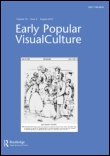
Early Popular Visual Culture
Illuminating the Past and Present of Popular Visual CultureEarly Popular Visual Culture, published by Routledge Journals, Taylor & Francis Ltd, is a pivotal academic journal dedicated to the interdisciplinary study of visual culture from historical and contemporary perspectives. Since its inception in 2009, this journal has carved out a niche within the academic landscape, achieving a notable Q2 ranking in Visual Arts and Performing Arts and Q3 in both Cultural Studies and History categories as of 2023. With an ISSN of 1746-0654 and E-ISSN of 1746-0662, it serves as a vital platform for scholars to disseminate cutting-edge research and critical analysis on visual phenomena that shape popular culture. The journal not only enhances scholarly discourse but also contributes significantly to the understanding of visual practices across different societies. Researchers, professionals, and students will find this journal invaluable for exploring the intricate interactions between visual culture and social contexts, thereby enriching their academic pursuits and insights.

Listy Filologicke
Connecting Disciplines: Where History Meets Linguistics and Literature.Listy Filologicke is a distinguished academic journal published by the Institute of Classical Studies at the Academy of Sciences of the Czech Republic, focusing on the interdisciplinary fields of History, Linguistics and Language, and Literature and Literary Theory. With an ISSN of 0024-4457 and an E-ISSN of 2570-9410, this journal has been a pivotal platform for scholarly discourse since its convergence years began in 2003. Notably, it holds a Q3 classification in History and Linguistics and Language, and a Q2 in Literature and Literary Theory as of 2023. Its rankings within Scopus illustrate its relevance and impact in academia, with noteworthy positions in the Arts and Humanities and Social Sciences categories. Researchers, professionals, and students will find Listy Filologicke an invaluable resource for exploring cutting-edge research, critical analyses, and discourse that contribute significantly to their respective fields. Based in the heart of the Czech Republic, it continues to promote scholarly excellence and foster international collaboration.
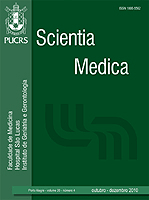
Scientia Medica
Exploring the Frontiers of Contemporary MedicineScientia Medica is a distinguished academic journal dedicated to advancements in the field of medicine, published by EDITORA PUCRS in Brazil. With an enduring commitment to open access since 2005, this journal fosters global dissemination of medical research, making significant contributions to the scientific community and empowering researchers, practitioners, and students alike. Although currently positioned in the Q4 quartile for Miscellaneous Medicine and ranked #415 out of 636 in the Scopus database, Scientia Medica is actively evolving to encompass a wide range of biomedical topics, promoting innovative studies that address contemporary medical challenges. Its address at Avenida Ipiranga 6681, Predio 33, Porto Alegre, RS, underscores its Brazilian roots while appealing to an international audience eager for quality research outputs. As the journal converges years from 2011 to 2024, it aims to enhance its impact and relevance, inspiring future generations of medical professionals.
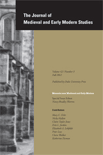
JOURNAL OF MEDIEVAL AND EARLY MODERN STUDIES
Connecting the Threads of Time and ThoughtThe JOURNAL OF MEDIEVAL AND EARLY MODERN STUDIES, published by DUKE UNIVERSITY PRESS, is a distinguished platform dedicated to exploring the intricacies of medieval and early modern cultures through an interdisciplinary lens. With an ISSN of 1082-9636, this journal has been pivotal in advancing scholarship from 2002 to 2024, providing researchers, professionals, and students with insightful contributions that enhance understanding within the fields of Arts and Humanities and Cultural Studies. With its current standing as Q3 in both category quartiles for 2023 and respectable ranking in Scopus, this publication attracts a diverse readership and stimulates critical conversations about historical narratives and cultural phenomena. Although not an open-access journal, its rich content serves as an invaluable resource for those seeking to delve deeper into the complexities of past societies. The journal’s commitment to excellence in scholarship underscores its vital role in the academic community.
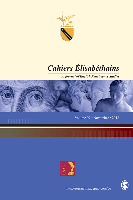
CAHIERS ELISABETHAINS
Advancing Scholarly Discourse in History and LiteratureCAHIERS ELISABETHAINS is a prominent academic journal published by Univ Montpellier, dedicated to the exploration of historical and literary themes. With ISSN 0184-7678 and E-ISSN 2054-4715, it has garnered attention both within the United States and internationally. As of 2023, it has achieved respectable rankings in its fields, holding a Q3 quartile in History and a Q2 quartile in Literature and Literary Theory, reflecting its commitment to scholarly excellence. The journal spans a comprehensive timeline from 2004 to 2024, offering a rich tapestry of research and insights into the intersection of history and literature. Although it does not currently operate under an Open Access model, the journal endeavours to present quality contributions that expand academic discourse. Researchers, professionals, and students alike will find in CAHIERS ELISABETHAINS a valuable resource that fosters critical engagement with the past and enriches the understanding of literary contexts.

Journal of Early Modern Studies-Romania
Charting the Cultural and Political Landscapes of Early Modern RomaniaThe Journal of Early Modern Studies-Romania serves as a vital platform for scholars and enthusiasts alike within the field of early modern studies. Published by ZETA BOOKS, this journal fosters a rich discourse on the cultural, political, and intellectual developments that shaped Romania and its connections to the broader European narrative during the early modern period. With an ISSN of 2285-6382 and an E-ISSN of 2286-0290, the journal is poised to contribute significantly to academic literature despite not currently being Open Access, facilitating access through academic institutions. The scope of the journal includes but is not limited to history, literature, art, and social studies, ensuring a multidisciplinary approach to early modern inquiry. Researchers, professionals, and students will find invaluable insights and innovative research avenues spotlighted in each issue, residing at the intersection of local and transnational early modern studies.
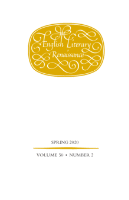
ENGLISH LITERARY RENAISSANCE
Fostering Critical Dialogue in Literary StudiesENGLISH LITERARY RENAISSANCE, published by University of Chicago Press, stands as a pivotal academic journal in the realm of Literature and Literary Theory. With a historical pedigree dating back to 1971, this esteemed journal has made significant contributions to the study of English literature, exploring a wide array of themes, methodologies, and critical interpretations that underscore the richness of literary discourse. The journal is ranked in the Q2 category for literature and literary theory and is positioned in the 89th percentile in the Scopus rankings, affirming its impact within the field. Although it does not operate under an open access model, ENGLISH LITERARY RENAISSANCE continues to attract a vibrant community of scholars and educators eager to engage with its rigorous scholarship and innovative approaches. This journal not only serves as a platform for groundbreaking research but also fosters critical dialogue that shapes the future of literary studies.